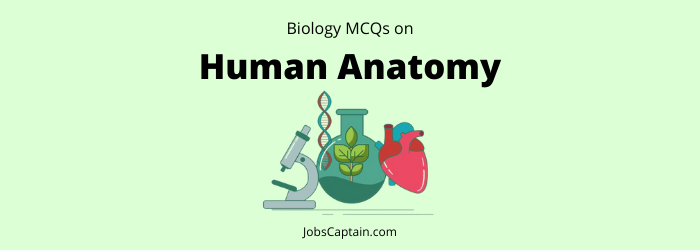
| Quiz Set | 1 | 2 | Topic Wise Biology MCQs |
Question 1. The most abundant element found in the human body is_____.
(A) Iodine
(B) Oxygen
(C) Sodium
(D) Iron
Question 2. The maximum amount of element found in human body is_____.
(A) Calcium
(B) Phosphorus
(C) Sodium
(D) Iron
Question 3. Weight of our body is mostly made of______.
(A) From water
(B) Parts of skin
(C) Parts of body
(D) From bones
Question 4. The percentage of water in an adult human body is around_____.
(A) 75%
(B) 65%
(C) 30%
(D) 10%
Question 5. The number of bones in an adult human body is______.
(A) 210
(B) 208
(C) 206
(D) 204
Question 6. The total volume of blood in a normal adult human being is_____.
(A) 10-12 litres
(B) 8-10 litres
(C) 3-4 litres
(D) 5-6 litres
Question 7. At the age of 20 years, the number of bones in human body is approximately______.
(A) 100
(B) 200
(C) 300
(D) None of these
Question 8. Which of the following is the smallest bone in the human body?
(A) Incus
(B) Malleus
(C) Stapes
(D) Vomer
Question 9. The smallest bone in our body is found in our______.
(A) Toe
(B) Eye
(C) Nose
(D) Ear
Question 10. The number of bones in human skull is______.
(A) 40
(B) 32
(C) 30
(D) 28
Question 11. Which one of the following salts is found in maximum amount in the human bones?
(A) Sodium Chloride
(B) Calcium Phosphate
(C) Calcium Carbonate
(D) Magnesium Chloride
Question 12. How many pairs of ribs are there in a human body?
(A) 11
(B) 14
(C) 10
(D) 12
Question 13. In human body, leg bone is_____.
(A) Rivet
(B) Solid
(C) Porous
(D) Hollow
Question 14. What is arthroplasty in surgery?
(A) Blood transfusion
(B) Hip Joint replacement
(C) Kidney transplant
(D) Open heart surgery
Question 15. How many pairs of nerves arise from the spinal cord?
(A) 12
(B) 33
(C) 31
(D) 13
Question 16. A healthy human being excretes the following litres of urine in 24 hours.
(A) 9.0
(B) 6.0
(C) 3.0
(D) 1.5
Question 17. The bones are held together by elastic tissues are called.
(A) Muscular tissues
(B) Fibrin
(C) Fibrous tissues
(D) Ligaments
Question 18. Plaques formed on teeth are made up of______.
(A) Food particles plus saliva plus mouth acids plus bacteria
(B) Food particles plus saliva plus mouth acids
(C) Food particles plus saliva
(D) Food particles only
Question 19. No pain is felt while cutting the nails because_______.
(A) None of the above
(B) Nails are made of calcium phosphate
(C) Nails are a useless part of the body
(D) Nails are made of the material of dead cells in which there is no blood circulation
Question 20. Which of the following are required for the formation of bones and teeth?
(A) Sodium and Potassium
(B) odium and Calcium
(C) Iron and Calcium
(D) Calcium and Phosphorus
Question 21. Which one of the following nutritional elements is not essential for the formation and strengthening of bones and teeth?
(A) Iodine
(B) Fluorine
(C) Phosphorus
(D) Calcium
Question 22. The number of teeth that are developed twice in the lifetime of human being is_____.
(A) 28
(B) 20
(C) 12
(D) 4
Question 23. Which of the following is the strongest part of our body?
(A) Cementum
(B) Dentin
(C) Enamel
(D) Bone
Question 24. The strongest muscle in human body is found in______.
(A) Hands
(B) Neck
(C) Thighs
(D) Jaws
Question 25. The temperature of the human body _____.
(A) Increases in winters
(B) Neither decreases in winters nor increases in summers
(C) Increases in summers
(D) Decreases in winters
| Quiz Set | 1 | 2 | Topic Wise Biology MCQs |
